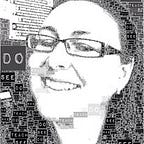The Value of Why
One of the great challenges facing teachers in today’s classrooms is that of student disengagement. For an increasing number of students, traditional methods of teaching (direct instruction, textbooks/ prepared notes, etc) are simply not enough to keep their attention and provide opportunities for deep learning. Some see this as indication that schools are lacking discipline and place an increasing number of strictures and standards on teaching; however some, like Monica Smedbäck Cardozo, believe that teaching practice needs to recognise that the skills students will need in the very near future are in many ways significantly different to those that their parents learned.
Monica is a Lead Teacher at Solna Stad in Sweden. She is an Apple Distinguished Educator and change maker who teaches Spanish, using the Future Literacies Framework as central to her teaching practice. Here Monica explains the why of this shift in thinking:
Q. What is it about the Future Literacies framework that makes sense for your practice?
Monica: Everything. The way I see it, I start being relevant and important for my students when they leave my classroom. Finding the framework put into words, in a very concrete way, what I believe should be the based of education, and of course my classroom. I talked a lot about emotional intelligence with my students, but the other “soft skills” exposed in the framework added a dimension that I have had, but need to reflect more on, make more visible and develop. The teacher is the best app, but all apps are worthless if they don’t fulfill a unique and real purpose; and if they don’t they can be substituted by another actual, digital, app.
Q. Is there a literacy that you or your students have difficulty with, and how would you support improvement in that area?
Monica: Well, I have just started to let them in the discussion, I have decided “we are going to work with this”, but until now I haven’t included them in the reflection. Now that I do, is turning out to be more interesting and even rewarding. But I think “benefit mindset” is difficult to apply to specific projects, for me personally. I need to get “networking” and “civility” more active. Branding and marketing are not really so present either. But, if we were all working together, I mean all teachers, that shouldn’t be a problem, as we could focus on different literacies depending on the unique strengths we have and the nature of the subject we are teaching. Trans-curriculum project could be extremely useful to develop many literacies at the time… improvement is probably in including other teachers in my classroom and even internationally, which is something I’m trying to get going for next semester.
Q. Technology: what’s one tech tool that you hope stays around in the future, and one that you will be pleased to see die out?
Monica: I like my Mac, the iPad and the phone… every one in its own way, wouldn’t want to be without them in different settings and uses. I would love to have them all in my classroom for each student! I would like to see the copier machine die, big time! Useless, pointless and actually you can’t motivate it when you have the technology and from the environmental point of view. On that opportunity that an actual paper in the classroom is needed, it should be enough to print, as it should be very little, but I think this only applies to bigger students. Small children up to 10–11 should be writing with pens and then worksheets are motivated.
Like a growing number of educators, Monica has found that the Future Literacies Framework supports learners and integrates easily with existing curricula. By including her students in the “why” of learning, Monica has shifted the focus of education onto the students, empowering them to take charge of their own learning, with guidance and support. In this Edunauts episode, Monica talks about the benefits and challenges associated with these changes and the effects they have on learners and fellow teachers.
Monica Smedbäck Cardozo can be contacted on LinkedIn and Twitter. For more information about the Future Literacies Framework, visit FutureWe.org.
